#Nahum Goldmann
Text
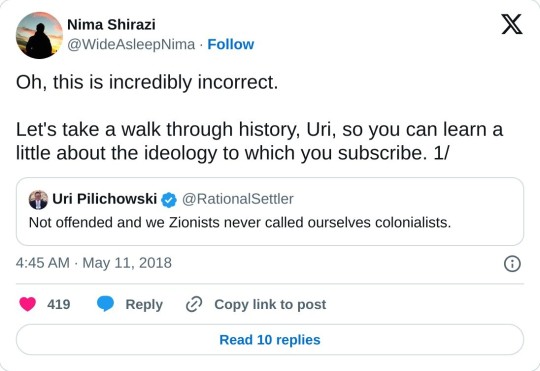
In 1862's 'Rome and Jerusalem,' perhaps the earliest Zionist text, Moses Hess asked France to "help the Jews to found colonies which may extend from Suez to Jerusalem and from the banks of the Jordan to the coast of the Mediterranean." 2/
In late August 1898, the Second Zionist Congress established the Jewish Colonial Trust, the financial arm of the World Zionist Organization and the first official Zionist bank. In 1902, the Anglo-Palestine Company Ltd. was founded as a subsidiary of the Jewish Colonial Trust. 3/
In 1902, Theodor Herzl, father of political Zionism, begged Cecil Rhodes to support the Zionist project and facilitate Jewish settlement of Palestine. Zionism was in Britain's imperial interest, Herzl suggested, "Because it is something colonial." 4/
Revisionist Zionist leader Vladmir Jabotinsky, who founded and led the Irgun militia, wrote explicitly in his 1923 Zionist manifesto, "The Iron Wall," that "Zionism is a colonization adventure and therefore it stands or it falls by the question of armed force." 5/
Jabotinsky also wrote, "Zionist colonization, even the most restricted, must either be terminated or carried out in defiance of the will of the native population," and that it was "necessary to carry on colonization against the will of the Palestinian Arabs." 6/
One of the leading Zionist organizations supporting the Yishuv (Jewish settlers) in Mandatory Palestine was the Palestine Jewish Colonization Association, established in 1924. (It was originally founded in 1891 as the Jewish Colonization Association.) 7/
The Jewish Agency, formed in 1929 by the 16th Zionist Congress, was (and is still) tasked with increasing Jewish immigration to Palestine. Its fundraising arm originally operated under the auspices of World Zionist Organization's aptly-named "Colonization Department." 8/
On October 5, 1937, David Ben-Gurion - later Israel's first prime minister - sent a letter to his son Amos in which he wrote that "Palestine...contains vast colonization potential which the Arabs neither need nor are qualified (because of their lack of need) to exploit." 9/
In mid-1947, the Jewish Agency presented its position to the United Nations Special Committee on Palestine. It declared "industrial development in Palestine" was "part of...the migration of industry from the old industrial countries to colonial or semi-colonial territories." 10/
During the presentation, Chaim Weizmann-later Israel's 1st president-stated, "As compared with the result of the colonizing activities of other peoples, our impact on the Arabs has not produced very much worse results than what has been produced by others in other countries." 11/
Moshe Shertok-Israel's 2nd prime minister-boasted of Zionism to the UNSCOP, saying "it will not be easy to find an instance in the history of colonization where a large scale settlement scheme has been conducted with so much respect for the interests of existing population." 12/
Clearly, Zionism's colonial nature was explicit from the outset and was leveraged as a selling point to gain European support. When colonialism began to lose legitimacy, the term was retired.
So don't ever claim that "we Zionists never called ourselves colonialists."
13/END
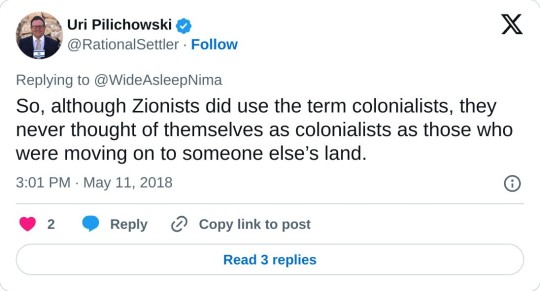
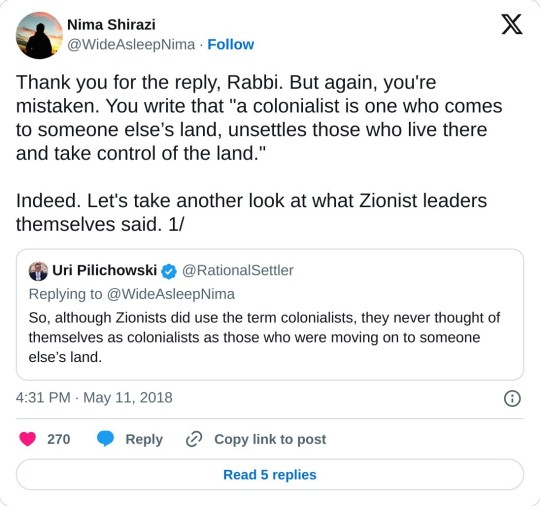
In 1891 leading Zionist thinker Asher Ginsburg (Ahad Ha'am) wrote that "when the life of our people in Palestine will develop to such an extent as to push out, to a small or large extent, the indigenous population of the country, then not easily will they give up their place." 2/
In 1898, Theodor Herzl recognized that, in order to establish a "Jewish state" in Palestine, the inconvenient indigenous population would have to be removed. “We shall try to spirit the penniless [Palestinian Arab] population (i.e. Arab) across the border," he wrote. 3/
Israel Zangwill, British leader of the Jewish Territorialist Organization (ITO), wrote in 1904 of "a difficulty from which the Zionist dare not avert his eyes, though he rarely likes to face it." It was that "Palestine proper has already its inhabitants." 4/
So what was his solution? "We must be prepared...to drive out by the sword the tribes in possession as our forefathers did."
Similarly, Chaim Weizmann referred to Palestinians as "the rocks of Judea, as obstacles that had to be cleared on a difficult path." 5/
his 1926 address to Nat'l Conference of the United Palestine Appeal in Boston, Weizmann said Palestinians "are in the country, and have been there for ages. We are the newcomers and have to become part and parcel of the country. We are planting a new people in the country. 6/
In 1929, early Labor Zionist intellectual Berl Katznelson declared, "Zionist enterprise is an enterprise of conquest," admitting that "it is by no chance that I use military terms when speaking of settlement." 7/
In 1930, Menachem Usshishkin, a powerful early pioneer of Zionism and leading member of the Jewish National Fund, stated, "If there are other inhabitants there [in Palestine], they must be transferred to some other place. We must take over the land." 8/
in 1936, Ussishkin commented, "Now the [Palestinian] Arabs do not want us because we want to be the rulers. I will fight for this. I will make sure that we will be the landlords of this land...because this country belongs to us not to them." 9/
In 1936, another leading Zionist, Arthur Ruppin, who led colonization efforts through the Jewish National Fund, declared, "On every site where we purchase land and where we settle people, the present cultivators will inevitably be dispossessed." 10/
In June 1937, David Ben-Gurion wrote to Jewish Agency head Moshe Shertok, "Were I an Arab...I would rebel even more vigorously, bitterly, and desperately against the immigration that will one day turn Palestine and all its Arab residents over to Jewish rule." 11/
Ben-Gurion told the 20th Zionist Congress in August 1937, "New Jewish settlement will not be possible unless there is a transfer of the Arab peasantry," adding, "Jewish power in the country...will also increase our possibilities to carry out the transfer on a large scale." 12/
At the November 21, 1937 meeting of Jewish Agency's Transfer Committee, Yosef Weitz, Land Department chief at the Jewish National Fund, boasted that "transfer" not only "diminish[es] the Arab population," but also "release[s] it for Jewish inhabitants." 13/
In 1938, Ben-Gurion reaffirmed these sentiments: "Let us not ignore the truth among ourselves. Politically we are the aggressors and they defend themselves. The country is theirs, because they inhabit it, whereas we want to come here and settle down." 14/
At the same time, Ussishkin insisted, "We cannot start the Jewish state with...half the population being Arab...Such a state cannot survive even half an hour." Regarding the forcible ethnic cleansing of over sixty thousand Palestinian families, he added: "It is most moral." 15/
Ruppin agreed: "I do not believe in the transfer of individuals. I believe in the transfer of entire villages." He also wrote, "Land is the most necessary thing for establishing roots in Palestine...We are bound in each case...to remove the peasants who cultivate the land." 16/
Moshe Shertok, Jewish Agency chief and later Israel's second prime minister, said, "We have forgotten that we have not come to an empty land to inherit it, but we have come to conquer a country from people inhabiting it." 17/
On March 20, 1941, the Jewish Agency's Yosef Weitz wrote, "The complete evacuation of the country from its other inhabitants and handing it over to the Jewish people is the answer." 18/
In 1941, Weitzmann told Ivan Maisky, Soviet ambassador to England, that "if half a million Arabs could be transferred, two million Jews could be put in their place. That, of course, would be a first installment; what might happen afterwards [would be] a matter for history." 19/
In a 1941 memorandum entitled "Outlines of the Zionist Policy", Ben-Gurion recognized that "the majority of the Arabs could hardly be expected to leave voluntarily," noting, "Complete transfer without compulsion – and ruthless compulsion, at that – is hardly imaginable." 20/
Founder and longtime president of the World Jewish Congress Nahum Goldmann recalled Ben-Gurion saying in 1956, "Why should the Arabs make peace? If I was an Arab leader I would never make terms with Israel. That is natural: we have taken their country." 21/
In 1969, Moshe Dayan declared, "Jewish villages were built in the place of Arab villages...There is not a single place built in this country that did not have a former Arab population." 22/
Again, Zionism is a colonial ideology that explicitly relies on the forceful removal of the native population from its homeland. To live in peace with those you have displaced, dispossessed & disenfranchised, you must guarantee equal rights for all. 23/END
#zionism#israel#nima shirazi#history#Moses Hess#Theodor Herzl#Cecil Rhodes#Vladmir Jabotinsky#David Ben-Gurion#Chaim Weizmann#Moshe Shertok#Asher Ginsburg#Ahad Ha'am#Israel Zangwill#Berl Katznelson#Menachem Usshishkin#Arthur Ruppin#Yosef Weitz#Nahum Goldmann#Moshe Dayan#colonialism#settler colonialism#irgun
14 notes
·
View notes
Text
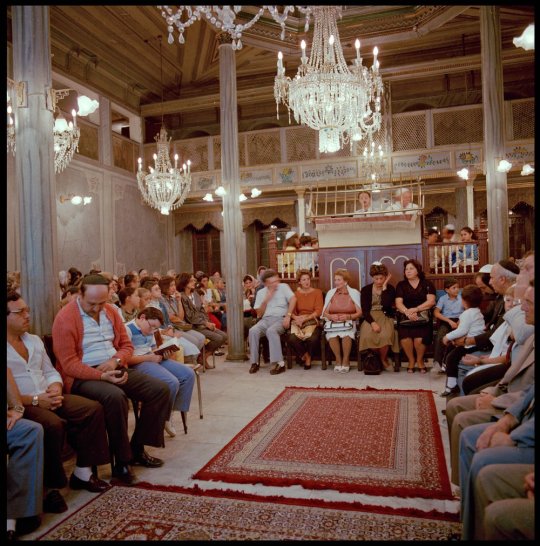


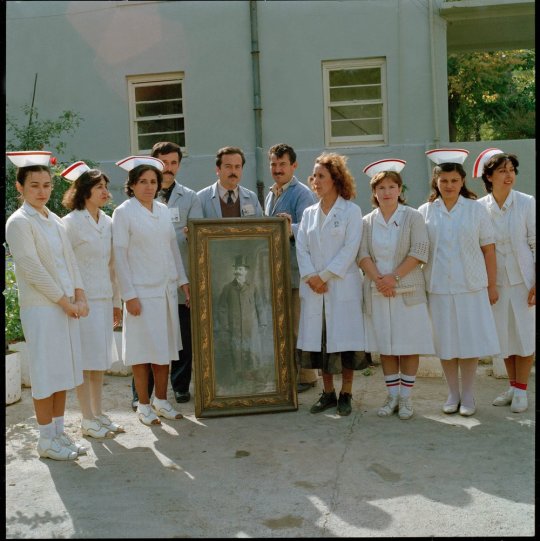


Laurence Salzmann, Anyos Munchos i Buenos/Celebrating Turkey's Sephardim: 1492-1992
In 1984, American photographer Laurence Salzmann and his wife Ayse Gürsan-Salzmann, a Turkish-born anthropologist, were invited by the Beth Hatefutsoth, the Nahum Goldmann Museum of the Jewish Diaspora, to create a photo-documentation of Jewish monuments throughout Turkey. In 1492, Sultan Beyazit II welcomed Sephardic Jews to the lands of the Ottoman Empire, following their expulsion from Spain. But monuments could tell only a half of the story, so, the Salzmanns expanded their photo project to include an in - depth photographic portrait of the Jews of Turkey, now numbering 22,000, and a film that explores the ways in which the Jews have become a favored ethnic group amidst a largely Muslim population.
338 notes
·
View notes
Text
Destruição, sempre e já!
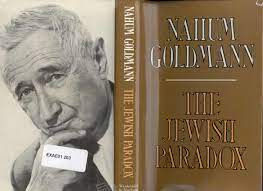
É uma REVELAÇÃO que vai dar o que pensar. Foi dada a público por NAHUM GOLDMANN na página 37 do seu livro “Der Geist des Militarismus” editado em 1915, Deutsche Verlagsanstalt, Stuttgart/Berlin.
Segue a tradução do extrato e ao seu final algumas palavras sobre a personalidade do autor do livro.
"A gente pode resumir o sentido e a missão histórica dos nossos tempos como segue: A missão é reordenar a humanidade cultural, criando um novo sistema social em lugar do que reina atualmente. Toda essa reordenação e reorganização consiste agora de duas partes: Na destruição da velha ordem e construção da nova. Inicialmente devem ser removidos todos os marcos de fronteiras, todas as barreiras e rotulações do sistema vigente e todos os elementos do sistema que vai ser reestruturado, como tal, devem ser separados equivalentes entre si. Só então poderá ser começada a segunda parte, a reordenação destes elementos.
Portanto a primeira tarefa da nossa época é a destruição. Todas as camadas e formações sociais, criadas pelo antigo sistema, devem ser extintas; os indivíduos devem ser arrancados de seus meios herdados; nenhuma tradição pode mais ser considerada sagrada; a idade valerá apenas como doença; a ordem é: Fora com o que já era.
As forças, que executam essa tarefa abstrativa na nossa era, são o capitalismo no campo econômico-social e a democracia no politicamente espiritual.
Todos sabemos o quanto já foi realizado, mas também sabemos que o trabalho ainda não foi concluído. O capitalismo ainda está lutando contra as formas da velha economia tradicional e a democracia ainda está travando uma batalha feroz contra todas as forças de reação. O trabalho será completado pelo espírito militarista. Seu princípio uniformizador dará conta desta incumbência negativa da época. Quando finalmente todos os membros do nosso círculo cultural tiverem sido uniformizados, como soldados do nosso desenvolvimento, esta tarefa estará resolvida.
Só então surge a outra tarefa maior e mais difícil: a edificação da nova ordem. Todos os elementos que foram arrancados do seu antigo enraizamento e de suas camadas sociais e agora estão espalhados de maneira desorganizada e anárquica, têm que ser estruturados em novas formações e categorias. Um novo sistema piramidal e hierárquico terá que ser erigido."
EIS UM PLANO CONCRETO PARA CRIAÇÃO DA NOVA ORDEM MUNDIAL
Nahum Goldmann
de 1953 a 1978 Fundador e Chefe do Congresso Mundial Judeu
de 1956 a 1968 Presidente da Organização Mundial Sionista
Líder da Internacional Socialista durante décadas
0 notes
Text
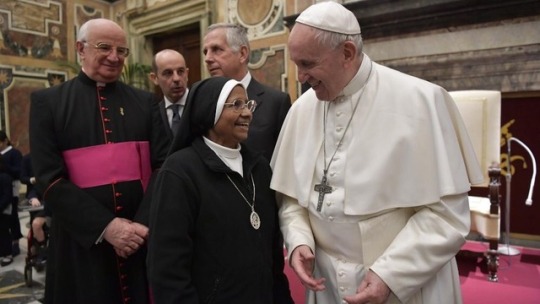
28th February >> (@Vaticannews By Lydia O'Kane) #PopeFrancis #Pope Francis During an address at a meeting commemorating the 50th anniversary of the death of Cardinal Augustin Bea, #PopeFrancis refers to the Cardinal as “an outstanding figure” who remains a "source of inspiration for ecumenical and interreligious dialogue".
Pope Francis: Cardinal Bea a model and inspiration for dialogue
Pope Francis addresses participants from a meeting commemorating the 50th anniversary of the death of Cardinal Augustin Bea.
By Lydia O'Kane
Cardinal Augustin Bea was the first President of the Pontifical Council for Promoting Christian Unity and worked tirelessly in the field of ecumenical and interreligious dialogue.
To mark the 50th anniversary of the Cardinal’s death, the Cardinal Bea Centre for Judaic Studies in collaboration with the Pontifical Council for Promoting Christian Unity, the Pontifical Biblical Institute and the Center for the Study of Christianity in the Hebrew University of Jerusalem, have been holding a series of scholarly lectures.
Addressing participants on Thursday, Pope Francis called Cardinal Bea, “an outstanding figure”, who should not only be remembered for what he did, but also the way he did it. “He remains”, the Pope said, “a model and a source of inspiration for ecumenical and interreligious dialogue, and in an eminent way for the “intra-familial” dialogue with Judaism.” Pope Francis recalled that Nahum Goldmann, then President of the World Jewish Congress, used three words to describe Bea: ‘understanding, good and courageous’
Love and respect, primary principles of dialogue
The Pope said that, “Cardinal Bea was convinced that love and respect are the primary principles of dialogue.” But the Pontiff also noted that the Cardinal did not always have it easy and “faced a number of obstacles in his efforts on behalf of dialogue.”
“Although accused and maligned” commented the Pope, “he moved forward with the perseverance of one who never stops loving. When told that the times were not ripe for what the then Secretariat for Promoting Christian Unity was proposing, he responded spiritedly: ‘Then we have to make them ripe’.”
Pope Francis continued, “neither an optimist nor a pessimist, he was a realist about the future of unity: on the one hand, conscious of the difficulties, on the other convinced of the need to respond to the heartfelt desire of the Lord that his disciples be ‘one’”.
“As Cardinal Bea put it”, emphasized Pope Francis, ‘the Council should not be a goal but rather a point of departure’”. The Pope underlined that, “dialogue calls for hearing two voices, and the witness of Jewish and Catholic instructors who teach together is worth more than many speeches.”
Pass beyond boundaries
“Up to now”, he pointed out, “Jewish-Christian dialogue has often taken place in settings for the most part reserved to specialists.” The Pope then added that, “friendship and dialogue between Jews and Christians need to pass beyond the boundaries of the scientific community. It would be wonderful, for example, if in the same city rabbis and parish priests could work, together with their respective communities, in service to those in need and by promoting paths of peace and dialogue with all.”
Pope Francis concluded by expressing the hope that this commemoration of the person and work of Cardinal Bea would be a stimulus to strengthening the irreversible commitment to the quest for unity between Christians, and to promoting in concrete ways renewed Jewish, Christian friendship.
Topics
ECUMENISM
POPE FRANCIS
ANNIVERSARY
AUDIENCES
28th February 2019, 11:52
2 notes
·
View notes
Photo




👉1ST-have a look at how #Jews, very fastidiously, forged a #reparations agreement w/state of @Germany after #WWII. CLICK HERE #ADOS #itcanbeDONE #comeuppance #tyranny #restitution #atrocities @tariqnasheed @NLIsrael @drboycewatkins1
In the autumn of 1949, with the foundation of the Federal Republic of Germany in the area occupied by the western Allied Powers, the nascent German state still lacked complete sovereignty in every realm. The laws of occupation were still valid and canceling them depended on a variety of political and financial arrangements. One of the conditions for complete German sovereignty pertained to the reparations to be paid to Holocaust victims. In principle, the political leadership of the State of Israel was interested in receiving reparations from Germany, but initially, was unprepared to enter into direct negotiations with German representatives. The Western Allied Powers for their part refused to demand reparations from Germany on Israel’s behalf, forcing both sides to sit around the negotiating table. Eventually, negotiations began in early 1952, in the city of The Hague, Holland.
The discussions between the two delegations were not easy. This was not surprising in light of the difficult topic and the fact that only seven years had passed since the liberation of the concentration camps and the end of WWII. Most of the population in West Germany opposed the reparations. The German public mainly was against the large sum that Chancellor Adenauer was prepared to accept as a starting point of the negotiations, some four billion German marks. However, Adenauer understood well that there was no alternative to reaching a compromise with the Israeli side, in order to restore West Germany to its proper standing among the nations of the world. In contrast, every claim against the East German government remained unanswered since the Communist regime, which obeyed instructions from Moscow, never recognized the responsibility of the entire German people for the Holocaust and the atrocities committed in its name until 1945. The discussions between the two delegations were not easy. This was not surprising in light of the difficult topic and the fact that only seven years had passed since the liberation of the concentration camps and the end of WWII. Most of the population in West Germany opposed the reparations. The German public mainly was against the large sum that Chancellor Adenauer was prepared to accept as a starting point of the negotiations, some four billion German marks. However, Adenauer understood well that there was no alternative to reaching a compromise with the Israeli side, in order to restore West Germany to its proper standing among the nations of the world. In contrast, every claim against the East German government remained unanswered since the Communist regime, which obeyed instructions from Moscow, never recognized the responsibility of the entire German people for the Holocaust and the atrocities committed in its name until 1945. Even before the negotiation between representatives of both countries (Felix Shinnar from the Israeli side and Franz Böhm from the German side) claims were submitted against formal entities in Germany. The claims were submitted at the level of various states within Germany that later comprised the Federal Republic – but there was no overarching German arrangement with clear objectives and sums. The negotiations between the countries were long and difficult. Many discussions were held, some of which conducted under a veil of secrecy out of fear that the representatives would be physically harmed. In May 1952, a serious crisis occurred, and the sides left the discussions following a heated debate regarding the amount to be paid as reparation. Ultimately, towards the end of 1952, the representatives – among them, the President of the World Jewish Congress, Nahum Goldmann – reached an agreement. According to the agreement, West Germany committed to supply the State of Israel with goods and services valuing 3.5 billion marks over a period of 12 years. Part of the agreement was the German assurance to enable personal reparations too, as well as the return of property to its legal owners. In order to follow through on this agenda, an additional sum of 450 million marks was promised. Not only did many German citizens have reservations about the agreement-in-process. Considerable portions of the Israeli public were also unprepared to accept neither the very concept of negotiations with Germany nor the funds from the “land of the murderers,” which was defined by opponents as “blood money.” Menachem Begin led the struggle against the agreement and against David Ben Gurion’s basic policy, which for years promoted rapprochement between Israel and West Germany. In the spring of 1952, when the negotiations between the two parties was already underway, Begin gave speeches at mass demonstrations organized against the reparations. Demonstrators included many Holocaust victims who had not come to terms with the contact between the Jewish State and the Germans, who only seven years earlier had been part of the Third Reich, the embodiment of evil in modern Jewish history. The short period of time since the Holocaust, the profound shock experienced by the Jewish public on discovering its extent and results, and the signs of Germany's quick rebound to the community of legitimate nations, aroused strong feelings and caused an uproar among the Jews in Israel and around the world. The thought that those who just yesterday had been the worst murderers of the Jews would today pay monetary compensation for an unforgivable crime was for many an intolerable prospect. A certain opposition arose also to the idea that the young State of Israel was taking on itself to represent the Jews as a whole and was agreeing in their name to accept monetary compensation from the Germans. The matter was so sensitive that the state authorities preferred to speak of “reparations,” relying on a little used Hebrew term, shilumim, which stresses payment and avoids describing the nature of the payment. The term replaced the problematic concept of “compensation,” in order to avoid creating the impression that the state believed that it was possible to compensate survivors and offspring of the victims for what the Nazis had done to them. On September 10, 1952, the representatives signed the agreement. The signing took place at a neutral location: at the town hall of Luxembourg. Moshe Sharett, as the Israeli Foreign Minister, Nahum Goldmann, representing the Jewish Agency, and Konrad Adenauer, as presiding Foreign Minister (together with his role as Chancellor of the Federal Republic). Today, most historians agree that it is thanks to Adenauer that the agreement received political support in Germany, support which had not existed during the various stages of contacts made to pave the way to the agreement. His sincere understanding that there was no doubt regarding the responsibility of modern Germany for Nazi crimes shaped one of the basic guidelines of German policy to this day. Indeed, Germany’s recognition of its responsibility for Nazi crimes and the special relationship with the State of Israel rooted in it are foundation stones in the relations between two countries, regardless of the makeup of the governments of Germany and Israel. As part of the reparations, many goods reached Israel which helped the state economy to stabilize over the years. For example, Israel received new-fangled German-manufactured trains, which were operated for a number of years by the Israel Railways. However, it quickly became apparent that the delicate motors could not withstand the climatic conditions of the Middle East, so that the trains were removed from service. Some of the cars enjoyed a surprising second career: one was donated to the medical non-profit “Yad Sarah,” and served as the organization's office in Jerusalem. Another car serves today as a home for the “HaKaron” ["the train-car"] puppet theater, located in the Liberty Bell Garden in Jerusalem
1 note
·
View note
Photo

“The fact that the creation of Israel entailed a grave injustice against the Palestinian people was well understood by Israel’s leaders. As [Israeli Prime Minister David] Ben-Gurion told Nahum Goldmann, president of the World Jewish Congress, in 1956, ‘If I was an Arab leader I would never make terms with Israel. That is natural: we have taken their country. Sure, God promised it to us, but what does that matter to them? Our God is not theirs. We come from Israel, it is true, but two thousand years ago, and what is that to them? There has been anti-semitism, the Nazis, Hitler, Auschwitz, but was that their fault? They only see one thing: we have come and stolen their country. Why should they accept that?.’ Ze’ev Jabotinsky, the founding father of the Israeli right, made essentially the same point when he wrote in 1923, ‘Colonization is self-explanatory and what it implies is fully understood by every sensible Jew and Arab. There can be only one purpose in colonization. For the country’s Arabs that purpose is essentially unacceptable. That is a natural reaction and nothing will change it.’ Berl Katznelson, a close ally of Ben-Gurion and a leading intellectual force among the early Zionists, put the point bluntly: ‘the Zionist enterprise is an enterprise of conquest.’” - Stephen Walt, chapter three, A Dwindling Moral Case, page 96 of “The Israel Lobby and U.S. Foreign Policy” (at Concord Museum) https://www.instagram.com/p/CGNLmpBHa0m/?igshid=18b3bq1sitzxy
0 notes
Text
Check out New Post published on Ọmọ Oòduà
New Post has been published on http://ooduarere.com/news-from-nigeria/world-news/six-million-9-11-iraq-epstein/
Six Million, 9/11, Iraq and Epstein
by Jimmie Moglia for Ooduarere via The Saker Blog
Scratching the surface of things is akin to scratching a lottery ticket. The results are routinely disappointing, sometimes unexpected, sometimes exceptional.
I recently attended an online conference, held by an Italian researcher named Mario Biglino. Mr. Biglino has dedicated many years to producing a new translation of the Bible. His effort centered on verifying and correcting official translations of the Bible from the Hebrew and/or Aramaic. With particular attention to original words whose meaning, or case, or number have been modified, in his view, to fit a particular pre-conceived theological or pseudo-theological scheme.
I briefly relate here what I have understood. There is no implication or even hint that I have any specific knowledge on the matter.
A typical example is the word ‘elohim,’ whose number is plural, whereas in the official home-Bible versions, the term is translated as if its number were singular.
In turn, through such change-of-number there derives the name ‘Yahveh.’ But according to a more accurate translation, the term ‘elohim’ is plural. Or rather, there were a number of ‘Elohim’ who fought among themselves – and quite brutally – for the possession of sundry chunks of Middle Eastern land – Yahveh being one of the Elohim. The saga of the internicine wars is varied and prolonged, and during the contests – that abound in the Bible – the prevailing Elohim often imposed the wholesale murder of women and children of the losing party.
The matter has stirred debates among lexicologists and theologians – though, in support of his translation, Mr. Biglino has found agreement even among the high echelons of Jewish academia.
It does not help that, as I have learned, the biblical Hebrew language did not have vowels. To alleviate the difficulty and to ensure some conformity of understanding, Jewish lexicologists added sundry dots and dashes below the consonants, in the way of vowels. This happened possibly around the 3rd-5th century AD, approximately when the Talmud was written.
But this is not what I would like to entertain or bore my twenty-five readers with. The above is intended as a background on the explorer, and as an introduction to another subject that also interested him, more historically verifiable but no less curious. Namely how the number of 6,000,000 among the Jews, victims or expected victims, appears in various occasions, publications and newspapers, as far back as the 19th century, up to 1200 AD and even to the year 135AD, as we will see next.
Mr. Biglino says that he began this research out of curiosity – though he says he was reprimanded by unmentioned sources, for cultivating an ‘unhealthy curiosity.’ Given that curiosity is the mother of knowledge, I fail to see unhealthiness in exploring this generally unknown chapter of historical statistics.
For we probably agree that there is no state more contrary to the dignity of common sense than that in which the understanding lies useless, and every opinion is received from external impulse.
In the instance, as you will see, the ‘external impulse’ is actually a fact, indispensable to form an opinion. And though it may be redundant to say it, the matter has nothing to do with ‘sensationalism’ of the type peddled by tabloids, ever ready to surprise the unawareness of the thoughtless.
The material is authentic and verifiable in the archives of the various publications involved.
Let’s start with,
“The Chicago Tribune,” July 19, 1921. Here are three titles:
Title A. 6,000,000 Jews in Bread Lines” Straus Writes – by Nathan Straus.
Title B, with Picture and Description “Nathan Straus, noted philanthropist and merchant, who pleads for the relief of destitute Jewish people in Eastern Europe”
Title C, (Straus) Begs America Save 6,000,000 in Russia. – Subtitle “Massacre Threatens All Jews as Soviet Power Wanes, Declares Kreinin, Coming Here for Aid.”
Beginning of Article:
Copyright 1921, by the Chicago Tribune Co.
BERLIN, July 19. – Russia’s 6,000,000 Jews are facing extermination by massacre. As famine is spreading, the counter-revolutionary movement is gaining and the Soviet’s control is waning. This statement is borne out by official documents presented to the Berlin Government, which show that numerous pogroms are raging in all parts of Russia….
The New York Times
published: October 31, 1911
Copyright © the New York Times
title: CHURCHES IN PLEA TO CZAR FOR JUSTICE
Creeds Unite In An Effort To End Religious Persecution In Russia
SEND RESOLUTIONS TO TAFT
Also Ask That Treaty Be Canceled Because Russia Has Not Accepted Our Passports
“The Resolutions.”
The resolutions passed were:
The 6,000,000 Jews of Russia are singled out for systematic oppression and for persecution by due process of law.
They are confined within congested districts at times ruinous to health.
Education is prohibited to all but a few, resulting necessarily in the increase of illiteracy.
They are restricted in occupations, reducing many to starvation.
… the list of grievances continues
The New York Times
published: May 9, 1920
Copyright © the New York Times
title: JEWISH CAMPAIGN EXTENDED A WEEK
Judge Rosalsky Announces That Efforts To Get Full $7,500,000 Will Continue
Full Quota Is Imperative To Succor 6,000,000 (Jews) Facing Starvation And Disease
… the need today is more pressing than ever because to farming and distress in some of the stricken district has been added the dread specter of typhus, and to abandon the sufferers now or to apply half measures in succoring then would mean that some 6,000,000 men women and children will be exposed to the menace of an awful death…
The Jewish Chronicle, April 7, 1939
Title: “Dictators Make Headlines… You Make the Eternal Story of Jewish Survival”
Subtitle: Not in Hitler’s Hands, in Yours…The Fate Of 6,000,000 European Jews –
United Jewish Fund Drive Gives You Chance To Help Suffering Millions –
by Maxine Hirsch Bader
The Palm Beach Post – Tuesday Morning June 25, 1940
DOOM OF EUROPEAN JEWS IS SEEN IF HITLER WINS.
NEW YORK. JUNE 24. – AP –
Dr. Nahum Goldmann, administrative committee chairman of the World Jewish Congress, said today that if the Nazis should achieve final victory, 6,000,000 Jews in Europe are doomed to destruction.”
“Their only hope for future existence is in the ability of Great Britain to resist the Nazi conquest.” Declared Dr. Goldmann, who arrived here Friday from Geneva. He issued a statement calling upon United States Jewry to take leadership in mobilizing Jews in North and South America for an organized defense program.
Address by Rabbi Wise at a Convention of Jewish Charities in Chicago. The clipping of the article does not include the date – estimated end of 1800, early 1900 (Rabby Wise died in 1927).
“The day would never come when I will care less for Zion, when there will be anyone who will strive more for the glorious ideals of Zionism. Two great conventions of Jews are being held tonight….(in Chicago)
There are 6,000,000 living, bleeding, suffering arguments in favor of Zionism. They do not to beg but ask for that which is higher than all material things. They seek to have satisfied the unquenchable thirst after the ideal. They ask to become once again the messengers of right, justice, and humanity.
… Of Israel and Zion one thing is true. They can conquer. God is our leader, and with the general of the heavenly hosts to lead, who we say that we go not to victory?
The New York Times
published: May 9, 1920
Copyright © the New York Times
HOOVER PLEA NETS $1,6000,000 FOR JEWS
Tells Of Typhus Menace At Launching Of New York Campaign For War Sufferers
3,000,000 CHILDREN IN NEED
Louis Marshall And Judge Elkus Picture Plight Of Stricken People – Large Contributions Made
… The menace of typhus was the note struck by all the speakers. Mr. Marshall declared that typhus menaced 6,000,000 Jews in Europe.
The Jewish Criterion
October 13, 1939
…. The coming world war would be the annihilation of the 6,000,000 Jews in East and Central Europe
For the next entry I could not source the newspaper, only the clipping of the article available. Estimate of the date: 1905-1910
title: DR. PAUL NATHAN’S VIEW OF RUSSIAN MASSACRE [Dr. Paul Nathan died in 1927] Startling reports of the condition and future of Russia’s 6,000,000 Jews were made on March 12 in Berlin to the annual meeting of the central Jewish relief league of Germany by Dr. Paul Nathan, a well-known Berlin publicist, who has returned from an extensive trip through Russia as the special emissary of Jewish philanthropists in England, America, and Germany, to arrange for distribution of the relief fund of $1,500,000 raised after the massacres last Autumn…
The American Jewish Year Book #5672
September 23, 1911, to September 11, 1912
The position of our coreligionists in Russia grows increasingly deplorable, and recent advice from the country indicate that there is little likelihood of any relief being afforded…. The situation is of the greatest. It may be doubted whether Jewry has ever confronted a greater crisis since the overthrow of the Jewish state by the Roman Empire. Not even the horrible persecutions of the times of the Crusades, or the expulsion from Spain and Portugal affected so large a mass of our coreligionists. Russia has since 1890 adopted is difficult to plan to expel or exterminate 6,000,000 of its people for no other reason them that they refused to become members of the Greek church, but preferred to remain Jews….
THEY WHO KNOCK AT OUR GATES
A Complete Gospel Of Immigration – by Mary Antin
printed 1914 – Houghton Mifflin Company
“those who think that with the Spanish Inquisition Jewish Martha Dom came to an end are asked to remember that the Kishinieff fair is only eight years behind us, and that Bielostock has been heard from since Kishinieff, and Mohileff since Bielostock. And more terrible than the recurrent pogrom, which packs and burns and tortures a few hundreds now and then, is it continues bloodless martyrdom of the 6,000,000 Jews in Russia through the operation of the anti-Semitic laws of this country…
TURTLE MOUNTAIN STAR, ROLLA, N. DAKOTA
title: Jews Are Fighting For A Homeland – October 6, 1918
Drawing of a man operating a horse drawn device, seemingly spreading seeds with a gun on his shoulder.
Script: ready at any moment to defend the strip which she is trying to convert to fertility is the Jewish settler of the Jesrcel Valley
“Five or 6,000,000 Jews, uprooted by dictatorships and tossed about by economic storms, may have to depend upon the development of the Holy Land, on the British mandate, as a solution of their difficulty. But they face the hostility of the Arabs living there, whose economic and religious interests conflict with theirs.
THE OPEN COURT – A Monthly Magazine
Devoted To The Science Of Religion, The Religion Of Science, And The Extension Of The Religious Parliament Idea
Vol. XI (no. 5) – May 1897
Chicago – The Open Court Publishing Company.
…. National fanaticism, indeed, was not extinguished; but it burned itself completely out in the vigorous insurrection led by Bar-Cocheba, the pseudo-Messiah, in which nearly 6,000,000 Jews lost their lives, with the famous Rabbi Akiba. One of the pseudo-Messiah’s most ardent adherents (135 AD). Titus, to annihilate forever all hopes of the restoration of the Jewish kingdom, accomplished his plan by establishing a new city on the side of Jerusalem, when she called Aelia Capitolina…
Furthermore, in a Jewish publication dated Nov 6, 1900, reference is made to a prophecy based on the ‘Sefer ha-Zohar’ a Cabalistic Bible written around 1200 AD. Where it is said that 6,000,000 Jews must die before (presumably) the others will be allowed to return to Israel. And the same Cabalistic word containing the prophecy of the 6,000,000victims, also predicts that the Jews will return to Israel in 1948.
And, in a Jewish magazine, shown by Mr. Biglino, Netaniahou told Putin that Iran plans to kill 6,000,000 Jews in their pending or imminent war against Israel.
Why should the above be of interest? – you may ask. I suggest two reasons, one historical, one current. For, as the world knows well, the limelight has not yet been turned off from the mysterious episode of a well-healed, well-known and well-connected pervert, who committed suicide while he couldn’t, wouldn’t or shouldn’t have been allowed to do so.
As for the historical reason(s), the Encyclopedia Judaica of 1954 printed that “several hundred-thousand” Jews had died in concentration camps, in World War 2, due to terrible conditions, famine and disease.
As a reminder, everyone knows that Americans with Japanese ancestry or Japanese appearance were interned into concentration camps, during World War 2. And though they did not suffer the consequences of carpet-bombing applied to the whole of Germany by the Allies, it is reasonable to suspect and expect that many died in the camps, during their internment.
But in the case under scrutiny, in 1972, in New York, the victims jumped from several hundred thousands to 6,000,000. Lest anyone suspect that raising the issue implies disrespect for the dead, I believe it should be the position of anyone and all to bewail and condemn even the death of one innocent victim.
In the instance, however, the issue is mathematics and history, rather than crime. When Columbus undertook the voyage of conquest in the Americas, it is estimated that Mexico had 20-million inhabitants – after the arrival of the Christians they were reduced to 2-million. In North America the natives were reduced from an estimated 80-million to 10-million
In other words, the effect of the genocide, resulting from the European invasion, was a radical reduction in numbers of the autochthonous populations. But with the ethnic group in question, the number of the affected population remains the same, before and after wars, persecutions or starvation. Which entails either a miraculous power of almost instant mass regeneration, anytime and anywhere, or a mathematical oddity of such scope as to be rated a conspiracy.
Hence the second and current reason why the recurring number of 6,000,000 may be of more than a historically-curious note.
It goes without saying that the universe is under the perpetual superintendence of uncontrollable forces. Philosophers and theologians have not yet satisfactorily resolved the issue. The doctrine of the enslaved will is at the core of the Protestant ideology. Luther struggled against evil and failed. Hence he rationalized his failure by claiming that there was no struggle. “I have often attempted to become good,” he said in 1524, “however the more I struggle, the less I succeed. Behold then, what free will is.”
With much necessary simplification, Calvin expanded on the idea, by providing a theological foundation for neo-liberal capitalism. The rich is by implication blessed by God – while the same God socks it to the poor. Interesting conclusion, for it follows that man is but a robot whose software, at least at present, is proprietary and in the hands of God.
But let’s for the moment set aside the thorny paradox. Wealth, as we know, is inextricably linked with greed and power. And through a quasi-alchemic combination, the evil produced by wealth and greed is proportional to power.
As a rule and as we know, political power pays deference to the idealized individual, the unsubstantial puppet, shown as a shadow on the walls of Plato’s cave. The greater the respect for the inexistent idealized puppet, the greater the contempt for the actual non-idealized flesh-and-bones individuals, meaning the people at large.
This everyone knows, but there are endless variations of the political pantomime – therefore it is easy to be drawn into following the detail, while losing sight of the whole.
As a rule, power can resist anything but temptation, and furthermore the power of evil is sadistic. It vicariously enjoys fooling the flesh-and-bones individuals in the Platonic cave, for each deception is a victory, and the bigger the deception the greater the victory.
On its side, evil can count on the lovers of secrecy. For it is natural that ‘secrets’ have intrinsic appeal. Check the secret formulas, the secret recipes, the secret remedies etc. Partly because to know a secret implies some distinction compared to those who don’t. Partly because secrecy partakes of the unexplained and, by extended inference, of the mysterious, the miraculous and the metaphysic. Consequently, it is natural and fertile ground for fanciful speculatists, and for the plentiful and wackiest theories invented by those who, by explaining the unexplained, pamper to their own vanity. All this is grist to the mill for evil, as the wackier is the theory the more easily it can be ridiculed as a ‘conspiracy theory.’
Conspiracy theory is a kind of quasi-theological term that defines heresy against the official doctrine. A doctrine that is itself a totally artificial construct. The new anti-conspiracy centers, censoring alleged “fake news” were established to prepare the ‘Revolution of Silence,’ while acting as disguised tribunals of inquisition. They simply indict him who gives a different interpretation to daily scriptures.
Nevertheless – at least it is pleasing to think so – there are limits to power’s implied presumption of gullibility, applied to the inhabitants of the Platonic cave, deceived by the shadows.
9/11, the Iraq War and now Epstein’s suicide qualify as master-examples of the theory applied to practice. There are more, but if these are not enough and do not stir the ‘distracted multitude who like not in their judgment but their eyes’… – stir them to quit watching the puppet show and ask for a reckoning, I don’t know what will.
For those who have been pushing for all the recent Middle Eastern wars and keep pushing for a war against Iran, may not be overly concerned about a global conflagration. Evil knows no limit, especially when the soldiers of evil know in advance that they will save their ass.
Or maybe we should trust chance. For chance is a subtle and insidious power that, at times, disrupts very elaborate, evil and lugubrious plans.
As for the business of the 6,000,000, it is now legally dangerous just to raise related questions in some European countries. Elsewhere it is not as yet illegal. Still, let the reader draw his own conclusions, in a low tone of voice.
0 notes
Quote
Nous aurions pu obtenir Madagascar comme territoire, mais nous maintenons nos exigences sur la Palestine, plaque tournante de trois continents et centre du monde au point de vue militaire, politique et stratégique.
Dr. Nahum Goldmann à Montréal, vers la fin de la guerre, in Adrien Arcand, A bas la haine!, Ed. La Vérité, Montréal, 1965).
0 notes
Photo
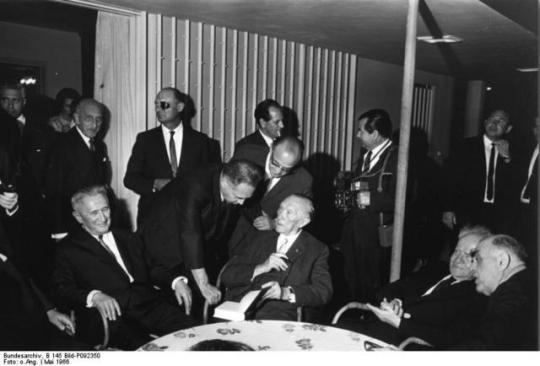
Die Israel-Mission war eine Verwaltungseinrichtung des Staates Israel zur Abwicklung von Wiedergutmachungsleistungen. Grundlage für seine Einrichtung war das Luxemburger Abkommen vom 11. September 1952, auf Grund dessen die Bundesrepublik Deutschland an den Staat Israel Waren als Aufbauhilfe lieferte. Die Mission hatte ihren Sitz in Köln.
Dr. Adenauer im Hause des Botschafters a.D. Felix Shinnars (stehend, hinter ihm, mit Brille) in Tel Aviv.
Links sitzend: Nahum Goldmann, Präsident des jüdischen Weltkongresses.
Rechts außen: Der Präsident der isralelischen Staatsbank, Förder, im Gespräch mit dem ehemaligen israelischen Ministerpräsidenten Ben Gurion.
Hinten Links, stehend mit Augenklappe: Landwirtschaftsminister Moshe Dayan.
Besuch Konrad Adenauers in Israel
Adenauer, Konrad Dr. (Bundeskanzler, CDU), Bundesrepublik Deutschland
Dayan, Moshe (Verteidigungsminister, Außenminister, General), Israel
Goldmann, Nahum (Präsident des Jüdischen Weltkongresses)
Ben Gurion, David (Ministerpräsident, Verteidigungsminister), Israel
Shinnar, Felix E. Dr. (Botschafter in der Bundesrepublik Deutschland), Israel
Die Leitung der Mission lag in Händen des Wirtschaftsexperten Felix Elieser Shinnar, der sein Amt im Rang eines Botschafters versah. Doch war er nicht der Repräsentant eines Staates, sondern nur der „Chef einer nichtdiplomatischen Regierungsagentur“, was bei diplomatischen Empfängen zu Protestnoten arabischer Länder führen konnte. Zuvor war er als stellvertretender Leiter der israelischen Abordnung maßgeblich an der Ausarbeitung des Wiedergutmachungsabkommens beteiligt. Seine Dienstzeit war von einem großen Engagement für den Aufbau der Beziehungen zwischen der Bundesrepublik und Israel geprägt. Ein Bericht in der Kölnischen Rundschau vom 22. Mai 1955 hob hervor, dass Shinnar von Beginn an um die Pflege guter Beziehungen „bestrebt“ war und großen Wert auf „äußerste Sparsamkeit“ legte.
Die Dauer des Luxemburger Abkommens, damit der Wiedergutmachungsleistungen und der Geschäftsgrundlage der Israel-Mission, war an die Höhe der von Deutschland an Israel gezahlten Jahresraten gekoppelt. Auf Basis der vorgesehenen Jahresrate von 310 Millionen D-Mark wäre das Abkommen zum 31. März 1965 ausgelaufen, was sich aufgrund einer vertragsgemäßen Reduzierung auf 250 Millionen D-Mark um ein Jahr auf den 31. März 1966 verzögerte. Daraufhin wurde die Israel-Mission im Mai 1966 aufgelöst.
Anlässlich des 60-jährigen Jubiläums der Einrichtung der Israel-Mission richteten die Stadt Köln, die Synagogen-Gemeinde Köln und die israelische Botschaft im Mai 2013 einen Festtag aus, im Zuge dessen am Jüdischen Wohlfahrtszentrum der Synagogen-Gemeinde in Köln-Ehrenfeld eine Gedenktafel angebracht wurde.
0 notes
Photo
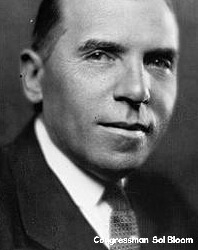
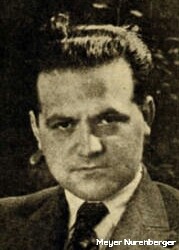
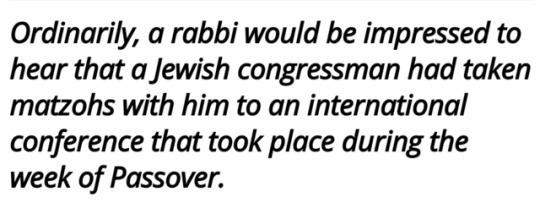
Meyer Nurenberger, however, was not at all impressed by Congressman Sol Bloom’s boast about bringing matzohs to the Anglo-American conference on the refugee problem, held in Bermuda in April 1943.
It was the peak of the Holocaust. The Allies had confirmed that the mass murder of European Jewry was underway, but refused to take any concrete action to intervene.
To counter mounting public criticism of their hands-off policy, the British and American governments announced they would discuss the issue in a conference on the island of Bermuda, far from the prying eyes of demonstrators and the news media. Their intention was that “it will take place practically in secret, without pressure of public opinion,” the Zionist leader Nahum Goldmann surmised.
Congressman Sol Bloom of New York City, a former vaudeville entertainer, chaired the House Foreign Affairs Committee and strongly supported President Roosevelt’s restrictionist immigration policy. When Bloom was chosen as a member of the American delegation to the Bermuda conference, many in the Jewish community saw the choice as a ploy to deflect criticism of U.S. refugee policy. Assistant Secretary of State Breckinridge Long privately wrote in his diary that he chose Bloom because the congressman was known to be “easy to handle” and “terribly ambitious for publicity.”
Nurenberger later cited a Talmudic anecdote to explain the phenomenon of prominent Jews who were more interested in fame and honor—such as serving on a U.S. government delegation—than in their welfare of the Jewish people. Nurenberger called it the “Mi BeRosh” [‘Who will be first?’] Syndrome.”
The anecdote, which appears in tractate Sanhedrin, concerns a Jewish king, Jeroboam, who caused a division of the Jewish commonwealth and even introduced idol worship, yet was given one last chance to repent. When Jeroboam died, the Talmud relates, God said to him, “If you repent, you and I and the Messiah will stroll together in the Garden of Eden.” To which Jeroboam replied, Mi beRosh? Who will be the one to walk at the head of the line? When God replied that Messiah would walk first, Jeroboam responded that he would not repent.
To which Nurenberger added this poignant commentary: “Since the days of Jeroboam, Mi BeRosh? has been the primary cause of lost opportunities and the greatest tragedies in Jewish history. Who will march at the front? Who will sit on the dais? Who will be Man of the Year? Who will be the leader? Who will deliver the main speech? Who will introduce whom at a meeting? Who will be applauded by the ladies’ auxiliary? Mi beRosh? How many Jews would have been saved during World War II if it had not been for Mi beRosh?”
Dr. Rafael Medoff is founding director of The David S. Wyman Institute for Holocaust Studies and author of 16 books about Jewish history and the Holocaust.
The conference lasted 12 days, yet neither the U.S. delegation nor their British counterparts managed to come up with any serious rescue plans. The Roosevelt administration would not agree to the use of any trans-Atlantic ships to transport refugees, not even troop supply ships that were returning from Europe empty. There would be no increase in the number of refugees admitted to the United States. And the British refused to discuss Palestine as a possible refuge, because of Arab opposition. When the conference adjourned, the two governments decided to keep the proceedings of the conference secret, to mask how little they had achieved.
Congressman Bloom, however, announced that “as a Jew,” he was “perfectly satisfied” with the results. In his autobiography, published after the war, Bloom continued to defend the outcome of the Bermuda conference, arguing that any announcement of aid to the Jews would have led “to intensified persecutions.” Congressman Emanuel Celler (D-New York) characterized Bloom as “a sycophant of the State Department.”
It was shortly after Bermuda that Bloom encountered Meyer Nurenberger. The Polish-born Nurenberger, who had earned rabbinic ordination but opted for a career in journalism, arrived in the U.S. in 1939 and began working as a reporter and columnist for the Morgen Zhurnal, a leading Yiddish daily.
As Nurenberger later recalled, Bloom “told me that he took along matzohs when he left for Bermuda—it was the Passover season—because he was such a good Jew. So I told him that I thought it would have been more important for him to eat bread there and save some Jews rather than to eat matzohs. He was very angry and told me he was through talking to me.”
I asked Nurenberger’s daughter, the Canadian-Israeli journalist Atara Beck, about her father’s unusual choice of words. “My father was an ordained Orthodox rabbi, and of course he would never have wanted any Jew to eat bread on Passover,” she said. “He was making a point—and it was a powerful moral point—saving lives is more important than rituals such as eating matzoh. Every Jew, even a congressman, needs to be reminded of that from time to time.”
Dr. Rafael Medoff is founding director of The David S. Wyman Institute for Holocaust Studies and author of 16 books about Jewish history and the Holocaust.
| United with Israel
https://unitedwithisrael.org/a-rabbis-unusual-passover-message-eat-bread-and-save-jews/?post_id=10154198388711871_10154692806501871#_=_
0 notes
Text
Nahum Goldmann was one of the leading Jewish figures during the twentieth century: He was both the head of the World Zionist Organization and the World Jewish Congress.
In his book “Mein Leben als deutscher Jude” (“My Life as a German Jew”), Dr. Nahum Goldmann describes the “phenomenal rise of German Jewry” as follows:
"German Jewry, which found its temporary end during the Nazi period, was one of the most interesting and for modern Jewish history most influential centers of European Jewry. During the era of emancipation, i.e. in the second half of the nineteenth and in the early twentieth century, it had experienced a meteoric rise…. It had fully participated in the rapid industrial rise of Imperial Germany, made a substantial contribution to it and acquired a renowned position in German economic life. Seen from the economic point of view, no Jewish minority in any other country, not even that in America could possibly compete with the German Jews. They were involved in large scale banking, a situation unparallelled elsewhere, and, by way of high finance, they had also penetrated German industry. A considerable portion of the wholesale trade was Jewish. They controlled even such branches of industry which is in general not in Jewish hands. Examples are shipping or the electrical industry, and names such as Ballin and Rathenau do confirm this statement. I hardly know of any other branch of emancipated Jewry in Europe or the American continent that was as deeply rooted in the general economy as was German Jewry. American Jews of today are absolutely as well as relatively richer than the German Jews were at the time, it is true, but even in America with its unlimited possibilities the Jews have not succeeded in penetrating into the central spheres of industry (steel, iron, heavy industry, high finance, shipping), as was the case in Germany.
Their position in the intellectual life of the country was equally unique. In literature, they were represented by illustrious names. The theatre was largely in their hands. The daily press, above all its internationally influential sector, was essentually owned by Jews or controlled by them. As paradoxical as this may sound today, after the Hitler era, I have no hesitation to say that hardly any section of the Jewish people has made such extensive use of the emancipation offered to them in the nineteenth century as the German Jews! In short, the history of the Jews in Germany from 1870 to 1933 is probably the most glorious rise that has ever been achieved by any branch of the Jewish people”. (p. 116)
"The majority of the German Jews were never fully assimilated and were much more Jewish than the Jews in other West European countries". (p.120)
"My work in those years was essentially of a propagandistic nature. I was too young and unknown to play a part in the leading circles of Germany, let alone of world Zionism, which was partially controlled from Berlin". (p. 121)
SOURCE: http://www.radioislam.org/islam/english/jewishp/germany/goldmann.htm
#israel#palestine#nahum goldmann#jewish#germany#hitler#history#world jewish congress#power#control#.
0 notes
Text
28th February >> (@Zenitenglish By Deborah Castellano Lubov) #PopeFrancis #Pope Francis: ‘It Would Be Wonderful if in Same City, #Rabbis & Parish #Priests Could Work, Together With Their Respective Communities, in Service,’ Says #Pope Francis
‘It Would Be Wonderful if in Same City, Rabbis & Parish Priests Could Work, Together With Their Respective Communities, in Service,’ Says Pope
‘May this commemoration of Cardinal Bea be a stimulus to strengthening our irreversible commitment to the quest for unity between Christians, & to promoting in concrete ways renewed friendship with our Jewish brothers & sisters’
FEBRUARY 28, 2019 11:11DEBORAH CASTELLANO LUBOVPAPAL TEXTS, POPE AND HOLY SEE
“May this commemoration of the person and work of Cardinal Bea be a stimulus to strengthening our irreversible commitment to the quest for unity between Christians, and to promoting in concrete ways renewed friendship with our Jewish brothers and sisters.”
Pope Francis stressed this today, Feb. 28, 2019, when addressing in the Vatican the participants in the meeting to commemorate the 50th anniversary of the death of Cardinal Agostino Bea, promoted by the “Cardinal Bea” Center for Studies Judaeans in collaboration with the Pontifical Council for Promoting Christian Unity, the Pontifical Biblical Institute and the Center for the Study of Christianity at the Hebrew University of Jerusalem.
Cardinal Bea, the Pope recalled, “should not only be remembered for what he did, but also the way he did it. He remains a model and a source of inspiration for ecumenical and interreligious dialogue, and in an eminent way for the “intra-familial” dialogue with Judaism.”
Pope Francis said he was neither an optimist nor pessimist, but rather a realist about the future of unity: on the one hand, conscious of the difficulties, on the other convinced of the need to respond to the heartfelt desire of the Lord that his disciples be ‘one.'”
The Pope, in his address, expressed his hope: “It would be wonderful, for example, if in the same city rabbis and parish priests could work, together with their respective communities, in service to those in need and by promoting paths of peace and dialogue with all.”
“I am confident,” he continued, “that your commitment, your research and personal ties between Christians and Jews can produce a fertile terrain for planting the roots of further communion.”
Francis recalled that Nahum Goldmann, then President of the World Jewish Congress, used three words to describe Bea: “understanding, good and courageous,” and the Pope went on to elaborate on each aspect.
Here is the Vatican-provided text:
***
Dear Brothers and Sisters,
I greet all of you and I offer you a warm welcome. I thank Cardinal Koch for his kind words of introduction to our meeting.
Your Centre, in collaboration with the Pontifical Council for Promoting Christian Unity, the Pontifical Biblical Institute and the Center for the Study of Christianity in the Hebrew University of Jerusalem, is commemorating Cardinal Augustin Bea by a series of scholarly lectures marking the fiftieth anniversary of his death. You thus have an opportunity to reconsider this outstanding figure and his decisive influence on several important documents of the Second Vatican Council. The issues of the Church’s relationship with Judaism, Christian unity, and freedom of conscience and religion, remain significant and extremely timely.
Cardinal Bea should not only be remembered for what he did, but also the way he did it. He remains a model and a source of inspiration for ecumenical and interreligious dialogue, and in an eminent way for the “intra-familial” dialogue with Judaism (cf. COMMISSION FOR RELIGIOUS RELATIONS WITH THE JEWS, The Gifts and the Calling of God are Irrevocable, 20). Nahum Goldmann, then President of the World Jewish Congress, used three words to describe Bea: “understanding, good and courageous” (Staatsmann ohne Staat. Autobiographie, 1970, 378). These are three essential requisites for anyone who works for reconciliation between human beings.
First, understanding with regard to others. Cardinal Bea was convinced that love and respect are the primary principles of dialogue. He was convinced that “Respect will also teach us the right way to propose the truth” (L’Unione dei Cristiani, 1962, 72). It is true: there is no truth apart from love, and love finds expression above all in the capacity to accept, to embrace, to take to oneself (“com-prehend”). Second, goodness and humanity, the ability to forge bonds of friendship based on our shared fraternity as creatures of God who is Father and desires us to be brothers and sisters. Understanding that accepts the other, and goodness that seeks out and creates bonds of unity: these were sustained in him – and here is a third requisite – by a courageous temperament that Father Congar defined as “stubborn patience” (S. Schmidt, Augustin Bea, The Cardinal of Unity, 1992, 538). Cardinal Bea faced a number of obstacles in his efforts on behalf of dialogue. Although accused and maligned, he moved forward with the perseverance of one who never stops loving. When told that the times were not ripe for what the then Secretariat for Promoting Christian Unity was proposing, he responded spiritedly: “Then we have to make them ripe!” (cf. A. BEA, L’ecumenismo nel Concilio, 1968, 36). Neither an optimist nor a pessimist, he was a realist about the future of unity: on the one hand, conscious of the difficulties, on the other convinced of the need to respond to the heartfelt desire of the Lord that his disciples be “one” (Jn 17:21).
As Cardinal Bea put it, “the Council should not be a goal but rather a point of departure” (L’unione dei cristiani, 22). With you, then, I would like to emphasize the fruitful advances made in dialogue between Jews and Catholics after Bea and following his example. Your Centre represents a fundamental step on this journey. In asking the Gregorian University to establish the Centre, the Holy See charged it to become “the Catholic Church’s premier program in Jewish Studies” (Joint Declaration on the Program of Jewish Studies, 14 November 2002). In reaffirming this desire, I congratulate the students who have undertaken the challenge of studying Hebrew and becoming acquainted with a religious and cultural world of great richness and complexity. I encourage you in this effort. I think too of the teaching staff, who so generously offer their time and expertise. In a particular way, I would say a word to the Jewish instructors from the Hebrew University of Jerusalem and elsewhere who are engaged in the work of the Centre. You are teaching in an environment where your very presence represents a novelty and already sends a message. How can we introduce students to authentic dialogue without knowledge from within? Dialogue calls for hearing two voices, and the witness of Jewish and Catholic instructors who teach together is worth more than many speeches.
How are we to continue this journey? Up to now, Jewish-Christian dialogue has often taken place in settings for the most part reserved to specialists. Specialized research and knowledge are essential but not sufficient. Together with this path, there is a need to set out on another, broader one: that of making known the fruits of the dialogue, so that it will not remain the prerogative of a select few, but become a productive opportunity for many. Friendship and dialogue between Jews and Christians need to pass beyond the boundaries of the scientific community. It would be wonderful, for example, if in the same city rabbis and parish priests could work, together with their respective communities, in service to those in need and by promoting paths of peace and dialogue with all. I am confident that your commitment, your research and personal ties between Christians and Jews can produce a fertile terrain for planting the roots of further communion.
Dear friends, may this commemoration of the person and work of Cardinal Bea be a stimulus to strengthening our irreversible commitment to the quest for unity between Christians, and to promoting in concrete ways renewed friendship with our Jewish brothers and sisters. With these prayerful good wishes, I invoke upon you and your work the abundant blessings of the Most High. Thank you.
[Vatican-provided English translation of prepared text]
28th FEBRUARY 2019 11:11PAPAL TEXTS, POPE AND HOLY SEE
0 notes